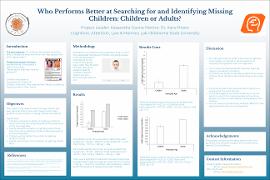| dc.contributor.advisor | Moore, Kara | |
| dc.contributor.author | Gaona, Kassandra | |
| dc.date.accessioned | 2022-05-13T19:30:59Z | |
| dc.date.available | 2022-05-13T19:30:59Z | |
| dc.date.issued | 2022-04-15 | |
| dc.identifier | oksd_Wentz_2022_gaona | |
| dc.identifier.citation | Gaona, K., & Moore, K. (2022, April 15). Who performs better at searching for and identifying missing children: Children or adults? Poster session presented at the Oklahoma State University Wentz Research Scholars Symposium, Stillwater, OK. | |
| dc.identifier.uri | https://hdl.handle.net/11244/335806 | |
| dc.description.abstract | The own-age-bias is the finding that people are better able to recognize faces from their own age group compared to other age groups. Children are better at recognizing the faces of children. Therefore, children may perform better at sighting missing children than adults. In this study, adult and child participants separated adult and child faces based on facial expressions while being on the lookout for 5 target faces. Afterwards, they were asked to identify if the faces shown to them were one of the 5 target faces shown at the beginning of the study. Although we are still collecting data for the children's participants, what we have found so far is that adults do present an own age bias whereas children show the opposite. Furthermore, adults perform better overall at identifying the target faces when compared to children. This means adults should continue to be recruited to help search for missing children. Further research needs to be done looking at whether different age groups of children exhibit the own-age-bias. | |
| dc.description.sponsorship | Lew Wentz Foundation | |
| dc.format | application/pdf | |
| dc.language | en_US | |
| dc.publisher | Oklahoma State University | |
| dc.rights | In the Oklahoma State University Library's institutional repository this paper is made available through the open access principles and the terms of agreement/consent between the author(s) and the publisher. The permission policy on the use, reproduction or distribution of the article falls under fair use for educational, scholarship, and research purposes. Contact Digital Resources and Discovery Services at lib-dls@okstate.edu or 405-744-9161 for further information. | |
| dc.title | Who performs better at searching for and identifying missing children: Children or adults? | |
| osu.filename | oksd_Wentz_2022_gaona.pdf | |
| dc.description.department | Psychology | |
| dc.type.genre | Poster | |
| dc.type.material | Text | |
| dc.type.material | Image | |
| dc.subject.keywords | own-age bias | |
| dc.subject.keywords | prospective person memory | |
| dc.subject.keywords | children | |
